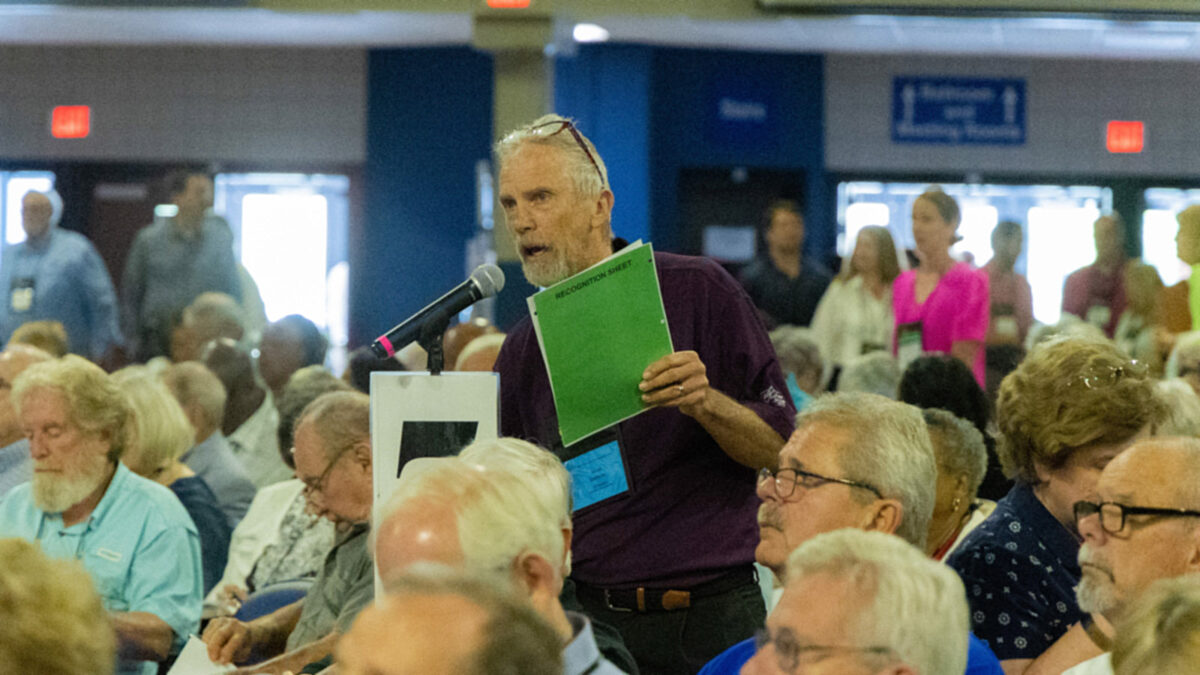
AC passes resolutions opposing death penalty and gun violence
Pictured, Mike Cochran proposes an amendment to the gun violence resolution. Photo by Matt Brodie.
By Jessica Brodie
FLORENCE—South Carolina United Methodists passed resolutions opposing the death penalty and committing to address the problem of gun violence during this year’s Annual Conference.
Four other resolutions slated for consideration by the body were deemed out of order because they were submitted by an unofficial conference group and not by an individual.
On the first day of business, June 5, the Rev. Steve Simoneaux offered recommendations from the Committee on Resolutions and Appeals, noting his committee recommended support for both the Resolution to Unequivocally Oppose the Death Penalty and a Resolution on Gun Violence as they generally reflect denominational principles.
‘Opposing death penalty’ resolution passes
The body addressed the death penalty resolution first, and it passed without debate or amendment.
Proposed by Wesley Chapel United Methodist Church, Lake City, and the Rev. Amiri Hooker, the resolution called for South Carolina United Methodists to unequivocally oppose the death penalty by holding vigils when an execution occurs, connecting with anti-death penalty efforts, advocating with elected officials and writing letters to people on death row, as well as calling for the bishop to write to the South Carolina governor asking for the death penalty to be abolished.
Gun violence resolution passes
The second resolution, proposed by Conference Connectional Ministries Advocacy Committee Chair the Rev. Bernie Mazyck and Hooker as South Carolina Board of Church and Society chair, prompted some debate, including an amendment that passed to strike a phrase regarding militarization of police and military equipment granted to law enforcement agencies.
“We need the cooperation of the police and military to help curb violence,” said Mark Cochran, laity from the Simpsonville Charge, who proposed the amendment.
While debate ensued about whether or not military equipment used by police is a threat to democracy, the amendment ultimately passed.
Another amendment, proposed by Bob Abbott, lay member of St. Luke UMC in the Hartsville District, proposed striking language that United Methodists advocate for the ban of large-capacity ammunition magazines and weapons designed to fire multiple rounds each time the trigger is pulled. He said the term “large capacity” was ambiguous and could apply to all guns.
Debate ensued about the reasoning and the way bullets and capacity works in different types of guns when they are fired, and the second amendment ultimately failed.
The gun violence resolution, which passed, encouraged United Methodists to address the epidemic of gun violence and to prayerfully address gun violence in their local context. Some of these ways include making gun violence a regular part of church conversation, assisting those affected by gun violence, making sure to safely and securely store guns and practice gun safety, hosting public prayer at sites of gun violence, partnering with police and community groups to address mass shootings, and advocating for laws that prevent or reduce gun violence, such as universal background checks.
Four resolutions from South Carolina Reconciling Ministries Network out of order
Much discussion ensued Monday about why four resolutions were ruled out of order. The four were all proposed by South Carolina Reconciling Ministries Network, an unofficial caucus of the UMC that works for full affirmation of all of God’s children, including LGBTQ+ persons, in the church and the world. The resolutions were to 1) Support removing all discriminatory policies and harmful language related to sexual orientation from the Book of Discipline; 2) Support the establishment of the government necessary to allow each region to design ministry for its particular contexts and be more effective in making disciples of Jesus Christ for the transformation of the world; 3) Support and amplify the LGBTQIA+ delegates’ call to justice and empowerment for the LGBTQIA+ community and for responsibility as United Methodists to do good, do no harm and stay in love with God; and 4) Express respect and gratitude for those who have voluntarily stepped away from positions of leadership as they journey away from membership in the UMC.
Holston explained that the resolutions were signed only as submitted by the SCRMN, which is why they were out of order. While there were calls from the floor to set aside Standing Rule 70, Holston said that motion would be out of order because the body cannot suspend a rule to consider resolutions not already properly before them. He further clarified the process—that per amended standing rules, all resolutions must be submitted by March 15 to be considered at Annual Conference.
Ellen Davis, lay member from Bethel UMC, Charleston, spoke from the floor seeking clarity. She said that when she received her Annual Conference packet she diligently sat and studied all the resolutions, fully expecting to vote on it.
“It’s in there,” Davis said. “Why is it not before us? I don’t understand.”
Holston explained that everyone has the right to propose a resolution, but the Committee on Resolutions and Appeals must then discern whether those resolution are able to properly go before the body.
He added that the resolutions can go before the 2024 Annual Conference if revised, and the submitters also have an opportunity to submit them to General Conference through that process.
Anne Walker, Alston Wilkes Society director and lay member of Trinity UMC, Sumter, asked why the submitters were not told when they submitted the resolution that they were out of order, as they could have revised and resubmitted it if they had known.
“The group met the deadline, so it feels very sneaky for this not to have been handled,” Walker said. “We know there’s disagreement, but for it to be pushed aside is just unconscionable, and I don’t understand why the folks receiving this … did not say, ‘This needs to come from an individual.’ Why did they not do that?”
She expressed a desire that the committee do this in the future.
The Rev. Paul Wood made motions to appeal the bishop’s and the committee’s decisions, but the motions were not permissible under current church law. With that, business moved on.
The next day, Dr. Roger Gramling, retired elder, proposed a motion to ask the Standing Rules Committee to consider amending Standing Rule 70 before Annual Conference 2024 authorizing the conference secretary and parliamentarian to review all submitted resolutions to determine if they are properly before the annual conference for consideration. If not, Gramling motioned, they would advise the resolution submitters that the deadline for the resubmission of corrected versions would be extended to March 25. The committee would report their consideration of this amendment to the 2024 session.
After a second, Gramling’s motion passed overwhelmingly with a hand vote.
